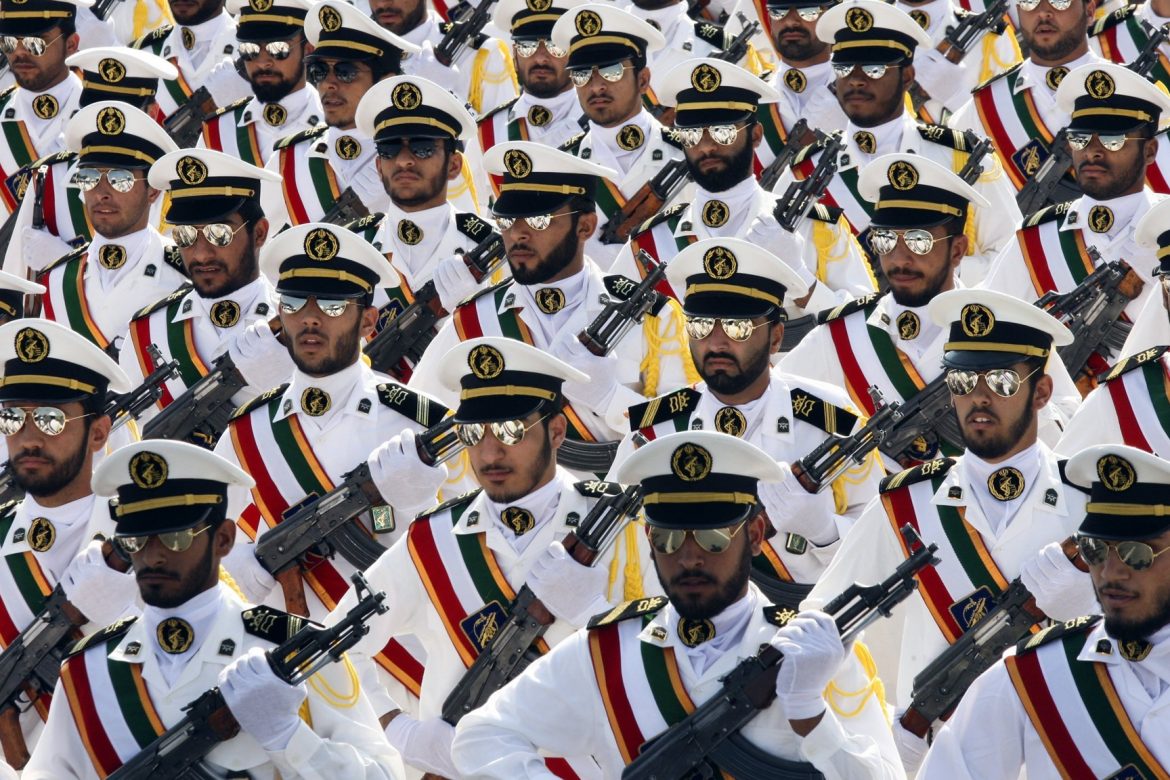This material belongs to: Asharq Al-Awsat.
London- Iran’s Revolutionary Guards Corps is being forced to shrink its sprawling business empire and some of its senior members have been arrested as part of President Hassan Rouhani’s attempts to curb the elite force’s role in the economy, the Financial Times reported.
In the past year, the guards, who have interests in sectors ranging from oil and gas to telecoms and construction, have had to restructure some holding companies and transfer ownership of others back to the state, a regime insider and a government official told the British daily.
At least a dozen guards members and affiliated businessmen have been detained in recent months, while others are being forced to pay back wealth accrued through suspect business deals, the officials said.
One manager of a large holding company affiliated to the guards was arrested a few months ago and cash worth millions of dollars was confiscated from his house, said a businessman who has worked with the guards. A brigadier general — described as the corps’ economic brain — was also arrested this year, but released on bail, the regime insider said.
The crackdown, which is being conducted discreetly to avoid undermining the guards — one of the most powerful arms of the regime — began last year. It started after Rouhani, a pragmatist who has criticized the guards’ role in the economy, told supreme leader Ali Khamenei about the vast wealth individuals affiliated to the 120,000-strong force had accumulated, the officials said.
“Rouhani has told the supreme leader that the economy has reached a deadlock because of high levels of corruption and the guards’ massive control over the economy,” said one regime insider, who is a relative of the supreme leader. “Other than economic concerns, Khamenei feels the need to save the guards [from corruption] and has naturally thrown his support behind the move.”
Khatam-ul-Anbia, the guards’ economic arm, declined to comment.
The Financial Times quoted Iranian analysts as saying that corruption involving politically connected individuals and entities is hampering economic development and efforts to boost growth as the country grapples with high unemployment.
Two months after he secured a second term in May elections, Rouhani said the guards had created “a government with a gun,” which “scared” the private sector.
The president has been seeking to open up Iran and attract foreign investment since he signed a nuclear accord with world powers in 2015. But he has faced resistance from hardliners within the regime, including the guards, who critics say want to protect their interests.
Under the nuclear accord, many sanctions were lifted and Iran agreed to scale back its nuclear activity.
There are few public details available about the Revolutionary Guards’ business interests. But some companies are known to be affiliated to the force.
According to the FT, these include Sadra Iran Maritime Industrial Company, which builds oil tankers and is involved in oil and gas projects, and Shahid Rajaee Professional Group, one of Iran’s biggest construction companies.
One of the guards’ consortiums, Etemad Mobin Development Company, bought Telecom Company of Iran, a state company, for $7.8bn in 2009. Other companies linked to the guards include Ansar Bank and Sepanir Oil and Gas Engineering.
The forces’ interests stretch across many other sectors, such as health, agriculture and petrochemicals.
But the US has retained financial sanctions related to Tehran’s alleged support for terrorism. The Trump administration has also imposed new sanctions on companies and individuals affiliated to the guards. The measures have put off international investors who fear they could inadvertently end up doing business with entities linked to the guards’ opaque empire.
There is little public information about the force’s business interests. Khatam-ul-Anbia’s website makes references to the areas it works in, including mining, petrochemicals, health and agriculture, but does not name companies. Some economists and businessmen estimate that the corps’ network of companies could be valued at around $100bn.
The guards involvement in the economy is traced back to the end of the Iran-Iraq war in the 1980s when commanders were rewarded with contracts to build roads, dams and bridges to help reconstruct the country.
The force’s business interests rapidly spread during the presidency of Mahmoud Ahmadinejad, a populist hardliner, as the corps was awarded state projects in strategic sectors, including oil and gas. The Telecom Company of Iran, a state entity, has since 2009 become a cash cow to fund the corps and its allies, political observers say.
Ahmadinejad’s rule from 2005 to 2013 was tarnished by widespread allegations of corruption. International sanctions against the country were also tightened during his presidency, but that presented those linked to the regime’s centers of power with the opportunity to use their networks to get involved in murky sanctions-busting deals, including selling crude, analysts say.
The government official said the guards have so far been complying with Rouhani’s efforts to scale back their economic interests.
“Whether he will succeed or not, Rouhani is standing firm and determined to bring the guards under the general umbrella of the economy and give them projects only under certain competitive conditions,” the official said. “The country’s economy is in such a critical state that there is no choice but for the guards to go back to its main military task.”


